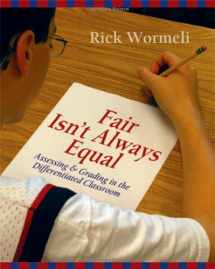
Fair Isn't Always Equal: Assessing & Grading in the Differentiated Classroom
Book details
Summary
Description
Differentiated instruction is a nice idea, but what happens when it comes to assessing and grading students? What's both fair and leads to real student learning?
Fair Isn't Always Equal answers that question and much more. Rick Wormeli offers the latest research and common sense thinking that teachers and administrators seek when it comes to assessment and grading in differentiated classes. Filled with real examples and “gray” areas that middle and high school educators will easily recognize, Rick tackles important and sometimes controversial assessment and grading issues constructively. The book covers high-level concepts, ranging from “rationale for differentiating assessment and grading” to “understanding mastery” as well as the nitty-gritty details of grading and assessment, such as:whether to incorporate effort, attendance, and behavior into academic grades;whether to grade homework;setting up grade books and report cards to reflect differentiated practices;principles of successful assessment;how to create useful and fair test questions, including how to grade such prompts efficiently;whether to allow students to re-do assessments for full credit.
This thorough and practical guide also includes a special section for teacher leaders that explores ways to support colleagues as they move toward successful assessment and grading practices for differentiated classrooms.


We would LOVE it if you could help us and other readers by reviewing the book
Book review



